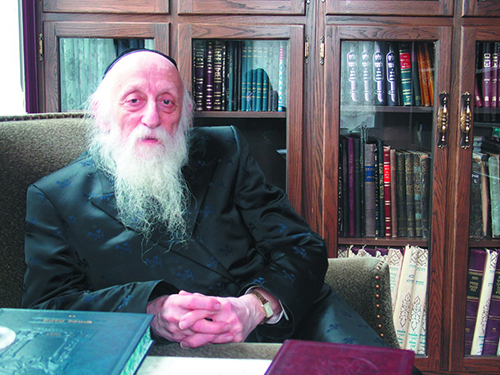

Teaneck—Rabbi Dr. Abraham Twerski, M.D. and the Sisters of Saint Francis, Order of Catholic nuns, were worlds apart in their theological beliefs. But they were completely united in their mission to help the mentally ill, alcohol- and drug -addicted patients in the psychiatric department of St. Francis General Hospital in Pittsburgh, Pa. Rabbi Dr. Twerski, a prolific author of over 60 books about psychology and self-help, and the founder of the Gateway Rehabilitation Center in Pittsburgh, has written “The Rabbi and The Nuns,” an account of how he came to be the Director of the Psychiatric Department in St. Francis and what he learned in the 20 years he spent there. The hospital closed in 2002.
“The Rabbi and the Nuns” is really several books in one. The main theme is the unusual but profoundly successful relationship between Rabbi Dr. Twerski and the staff and patients of St. Francis. The book is a window into a culture not on the radar of most Jews, and shows how problems of the mind and body affect people in all walks of life. But it is also the story of how Rabbi Dr. Twerski confronted his self-esteem and identity issues to carve out his path in life; how he was able to heal patients with a different religion; and how psychology has evolved to treat patients with mental illness. He writes in clear, conversational prose, bringing in anecdotes to illustrate psychological concepts. Readers at any level of familiarity with psychology will come away with a good understanding of the demons that can haunt us and how they are best treated.
In a conversation with JLBC, Rabbi Dr. Twerski said there is still a stigma in the Orthodox community about treating mental illness and some of it stems from Freud. In 1960, when he began training, treatment was based on Freud’s concept that all religious thinking was neurotic. The psychiatrist rabbi said Jewish authorities told people they weren’t allowed to go to a psychologist, that it would take their religion away, which was a legitimate concern at the time.
In fact, he said, religion is at the core of leading a meaningful life. “People of religion share the idea that life has a purpose, even if we don’t understand what it is. Secular people have trouble finding a purpose. If you think the world was not created, that it was an accident, it leads to a purposeless, depressive feeling.”
Religion got a bad rap from Freud, he said, and psychoanalysis lays a person’s troubles at the feet of his parents. “The idea that a person’s problem is the fault of their parents is a serious mistake,” Rabbi Dr. Twerski said. “You have a problem; you can do something about it.” Today, Cognitive Psychology, with its emphasis on helping a person take charge of his life, has replaced psychoanalysis.
The other obstacle to treatment in Orthodox circles, said Rabbi Dr. Twerski, is the fear that there will be a negative impact on a person’s shidduch prospects. “I try to educate people not to be afraid of medication,” the doctor said. “They think it will ruin their shidduch. But untreated depression or OCD is a much greater problem.”
Why and how he came to these conclusions become clear in his latest book, written with refreshing honesty about how he yearned to fill his father’s shoes but became convinced that following him as pulpit rabbi was not his calling. “I visited a parishioner in the hospital who had undergone surgery. He said to me, ‘ever since my operation, I was not free of pain. Nothing the doctors prescribed seemed to help. But yesterday, when your father walked in, I felt the pain lift off, as if by magic.’ I said to myself, this is one act that I am not going to follow.” Instead, he chose medicine and specifically training in psychiatry.
Rabbi Dr. Twerski told JLBC that respect was the key to his partnership with the nuns at St. Francis. “When you have respect, you don’t have to agree.” He also developed close ties with Bishop Wright, who became a cardinal and number three man in the Vatican. He moved to Rome, but returns to Pittsburgh annually for a visit. “We had a warm relationship, and were able to kid each other, even though we were poles apart,” Rabbi Dr. Twerski said. He writes that the bishop asked for his blessing at each visit. “‘Bless me, rabbi,’ he would say, and every time we met, that is how I took leave of him.”
Key psychological questions are addressed in this simply written but impressive book. How do you determine when a patient’s problem is emotional or physical in origin? What is the difference between depression and sadness? When is medication helpful? How successful are alternative treatments such as hypnosis? Can long buried memories cause current difficulties? Is addiction a disease or a moral failing? He learned about the role emotions play in our well-being while he was an intern at St. Francis and describes the most poignant events that touched him at St. Francis.
He also writes about mental illness brought on by a drug reaction or physical ailment. An 82-year-old nun was brought to him because she was hallucinating. They were able to determine that the hallucinations were caused by eye drops administered to her during a visit to the eye doctor earlier in the day. Internal factors can also be responsible. He explains: “There are many depressions that are primarily due to neuro-hormonal changes in the body rather than psychological causes. Any stress to the body, e.g. severe virus, surgery or the hormonal changes incident to childbirth or menopause, can cause a biochemical depression. These are best treated with medications that can correct the chemical imbalance. Groping in the patient’s history for psychological causes may sometimes be counterproductive.”
The rabbi became an authority on alcoholism and addiction, conditions he first encountered at St. Francis. He is incredulous that his medical education did not include any training in substance abuse. To learn about alcoholism he began going to Alcoholics Anonymous (AA) meetings, a program he praises highly. He said AA succeeds largely because it is about character refinement and it is completely egalitarian. Judges, priests, the homeless—all are equal in AA and no one gets special treatment.
He told JLBC the 12 step AA program is taken almost word for word from writings about mussar. But there are people very learned in mussar who are also addicts. How is AA different? Rabbi Dr. Twerski said, “A person who is sincere in recovery leaves an AA meeting and thinks ‘if I deviate, I die.’ No one leaves mussar thinking they’ll die if they don’t continue. We say Torah is our life, but do we realize that if we deviate, we die?”
Rabbi Twerski emphasized the danger for a recovering alcoholic or drug addict when he needs to be hospitalized. Addiction often begins with prescribed pain medication. People can be very creative about going to several different doctors for prescriptions. If a person recovers and then needs treatment that requires strong painkillers, the cycle could begin all over again. Rabbi Twerski said he has a video for doctors to instruct them on how to treat the recovering addict’s initial pain and then wean the patient from the drugs. Part of the training includes ignoring the patient’s threats and tantrums. He has called the sponsors of AA members who have to be hospitalized and requested that someone volunteer to be with the patient 24/7 and hold his hand.
Rabbi Twerski lived in Pittsburgh for 40 years. Just as he thought about retiring, his wife passed away. Two years later, he met his current wife, Gail, also a therapist. Rabbi Twerski said although he is chassidish, he is comfortable living in Modern Orthodox Teaneck. “I am comfortable everywhere, but belong nowhere,” he says philosophically. He reads the classic mussar text, Alei Shur, by Rabbi Shlomo Wolbe every morning. “Rav Wolbe went to the University of Berlin,” the rabbi said. “He was very knowledgeable about psychology.”
Looking at society today, the good doctor laments that our whole culture is based on throwing things out rather than fixing them, an attitude that has seeped into our marriages. “Young people approach marriage wanting to know what they are getting, instead of asking what I can give. When their expectations aren’t met, they are frustrated. We used to have a culture where if things got broken, we fixed them. Now, if our cell phone goes kaput, we throw it out. Phones, contact lenses, diapers, cameras, they’re all disposable. There is no tolerance for repair.”
Rabbi Dr. Twerski says virtually all psychology has its basis in self-esteem—not narcissism but a healthy concept of who you are. Sometimes, we hold onto a mistaken and damaging self-concept that we have to shed. He shared this story: A peasant came into the big city for a new suit. He went into a store and the salesman picked out a handsome suit in his size and told him to try it on. The man comes out of the dressing room in a rage and says ‘you’re making a fool of me!’ The salesman tells him gently, “You have to take off your old clothes first.’”
By Bracha Schwartz











